The Zombie Invasion of Pop Culture: They Want Your Brains
From a pop culture standpoint, the zombies have taken over. They’re everywhere. Everything from rom-coms to comics has been bitten. They swarm campuses in Humans vs. Zombies games. They invade the past to fight Abraham Lincoln and Lizzie Bennett. Knockoff versions scare us in Harry Potter and Steven Universe. Even the CDC is on the bandwagon, using zombie tactics to spread disaster preparedness tips. Even when the trend seems to be rotting away, something in video games, films, TV, and literature keeps it animated. They may be a joke, but they’re a dead horse you can’t help but beat—because it’s slowly stalking you, and it wants your brains.
So why do we love these moaning, groaning bags of flesh? What is it that gives rise to interpretations ranging from Resident Evil to ParaNorman? Zombies appeal to creators and audiences in three simple ways: by being the perfect monster, by necessitating extreme violence, and by bringing on the apocalypse.
But before starting the autopsy, let us first take a look at the life history of the zombie.
From Voodoo Victim to Violent Villain: A History of the Zombie
The word “zombie” comes from colonial Haiti during its days of massacre-by-slavery. Slaves’ work and treatment was so awful that some slaves took comfort in dying, calling it “going home to Africa.” A zombie was denied that final freedom, cursed by an evil master who manipulated voodoo. A zombie was enslaved even after death, working a plantation without food or sleep, unable to have power over even their mind and death. This zombie was not a monster, but a wretched puppet to colonial masters (Boon).
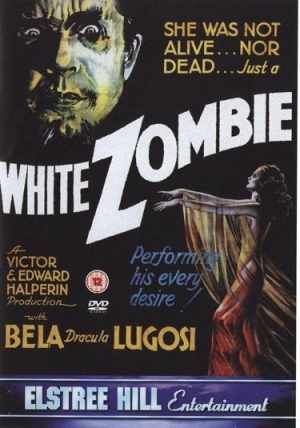
The cultural appropriation of the zombie for white America’s tastes began in film with the appropriately named The White Zombie in 1932, which used voodoo as an exotic danger to vacationing Americans. But the first zombie movie, as audiences today would consider it, was George Romero’s Night of the Living Dead in 1968. How did these grave-rising, man-eating undead things evolve from the original zombie?
It’s not entirely clear. There were a lot of influences that made this beast. There was the old colonial fear-fetish of cannibalism in the Caribbean that became tied to the origin of the zombie. There was the idea of Arabian ghouls, inhuman spirits who ate the dead. There were Cold War fears of both invasion and domestic treason. All of these seemed to influence Romero’s work, or at least work immediately following. (A pre-Romero influence on later zombie works was Richard Matheson’s I Am Legend novel in 1954, though his plague-monsters were called vampires.)
And then there they were, the new darling of the film industry. There was a surge of classic zombie movies bridging the black-and-white to color shift, then a decline in the face of ridicule. From approximately Michael Jackson’s Thriller in 1983 to 28 Days Later in 2002, there was a hibernation in all forms except video games, which brought in zombies as gun fodder in the ‘90s (Bishop). Now they’re back, though for how long is up in the air. I do have a feeling, though, that even if they fade again, they won’t ever truly go away.
Have You Tried Using Your Swords?
So why are zombies so strong right now? The first reason is that they are the perfect monster. They aren’t evil—they don’t have the brainpower. They don’t give us a chill like Hannibal Lecter or loathing like Goldfinger. They just bring fear.
For one thing, zombies are a fill-in-the-blank metaphor for any social trouble. Depending on the film, show, game, or book, the zombie war can be about inter-generational conflict, technology, dull office jobs, over-eating, capitalism, communism, world hunger, AIDS, Hurricane Katrina, or 9/11 anxiety (Rafferty; Dendle; Brodesser-Akner; Bishop).
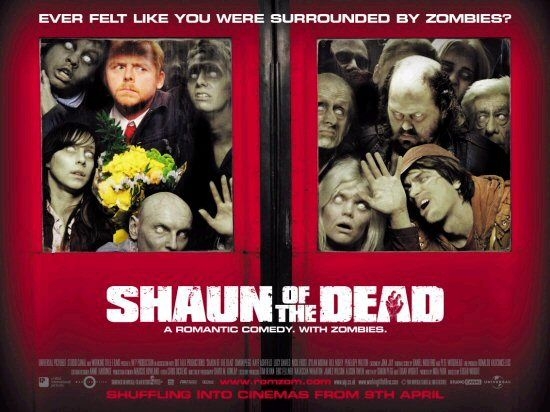
But zombies are ultimately symbolic of one thing: death. They are literally corpses come to take you with them. This is the most basic and primal fear, and it is heightened with an absolute perversion of the hoped-for afterlife: needful body arisen, guiding soul gone.
This potent fear is not complicated by moral grayness. Zombies cannot be redeemed, and over and over again protagonists must show their loved ones the shotgun mercy. Monster and victim have become one. In this way, grief and pity get rewired into anger and fear. Though some works use this as an exploration of guilt (e.g. The Walking Dead), mostly it’s an easy way to action-pack the movie. Which brings us to…
The Good Guys Get Chainsaws
Another reason zombies are so popular is a very simple one: they are built to be destroyed.
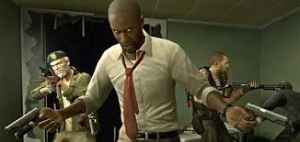
It’s an established fact that violence sells, whether out of morbid fascination or Bacchanalian catharsis (Bishop). But to imagine it free of consequence, there needs to be a black-and-white world of morality. Extend the last section’s idea of zombies as that perfect monster, then add to that disgustingness, relentlessness, numbness, and the idea of “putting them out of their misery,” and there you have it, a guilt-free gore machine. As Peter Dendle writes in The Zombie as a Barometer of Cultural Anxiety:
“Much of the fun in zombie movies by this point is, after all, to come up with creative new ways of offing them in the messiest way possible… Since the audience knows that the zombies are usually not sentient and in most cases do not feel pain, it is free to enjoy the spectacle of wanton destruction of human bodies rather than human beings.”
There is no better way to dehumanize someone than to make them silent, violent, and better off dead. One example is the 2011 game Tea Party Zombies Must Die, in which Fox News right-wingers became rampaging zombies and you have to put them down (Freeman). The more complicated evil of politics is simplified with the disgusting horror of zombies. The good guys are elevated by survival skill, and if that means serial killer habits, then all the better for the splatter.
A Human-Eat-Human World
Zombies, like ants, do not work as a threat on their own—it is their very excess which characterizes their method of attack. Max Brooks, writer of zombie gospels World War Z and The Zombie Survival Guide, said, “You can’t have one zombie. You’ve got to have millions of them. Society has to be breaking down” (Brodesser-Akner). What Romero brought in as anarchy has bloomed into apocalypse—the final reason behind zombies’ success.
There’s something about the apocalyptic clean slate, even washed by blood, that captures the imagination. The genre of zombie fiction cleverly combines the science fiction of a wrecked future with the nostalgia of a simpler time. Churches, hospitals, and police are helpless, and humanity is whatever the survivors make of it.
In The Walking Dead (2003- as comic, 2010- as TV show) and Zombieland (2009) there are scenes which demonstrate the social upset. In The Walking Dead a prison becomes a coveted place of shelter, and Zombieland sees the main characters actually roll around in now-worthless money. The old rules have no bearing.
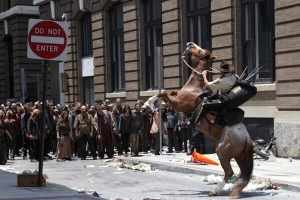
The Walking Dead also epitomizes what scholars call the “frontier feeling” of this new world. Even without the obvious rural feel, as cities are death-traps, characters become sheriffs, lone wolves, or posses. The law is what they make it, and they prove their mettle day after day with no social luxuries. Again, Peter Dendle extensively addresses this in The Zombie as a Barometer of Social Anxiety:
“In twenty-first century America…amidst a suburban landscape now quilted with strip malls and Walmarts—there is ample room to romanticize a fresh world purged of ornament and vanity, in which the strong survive, and in which society must be rebuilt anew. Post-apocalyptic zombie worlds are fantasies of liberation: the intrepid pioneers of a new world trek through the shattered remains of the old.”
Whoever survives are the blessed heroes, the chosen few. They are Adams and Eves of Armageddon, our last representatives, and the thought experiment of every philosopher wanting to know the essence of human nature. The ravaged backdrop makes any character standing against it a diamond of humanity. Even if they were once nothing—clerks, criminals, nerds, housewives—they rise to the new standards, as in Shaun of the Dead (2004), Juan of the Dead (2011), and Max Brooks’s World War Z.
Misunderstood Monsters?
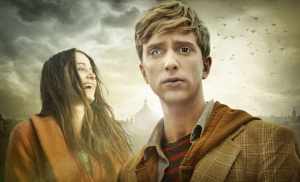
Of course there are the subversions, the romances, comedies, and both (“zom rom-coms,” my friend dubs them). Romance is, as it often is, a tool of redemption. This is visible in In the Flesh (2013-14), the Generation Dead series by John Lindqvist, and Warm Bodies (2013). After all, we use love and compassion as code for “humanity” every day. Romance can also highlight the individuality of a being. The display of love, personality, and feelings in creatures founded on rage, mindlessness, and lack of feeling destroys the psychological conception of a zombie. Where once the physical and mental destruction matched and morality was black and white, things are restored to a complexity.
There are also comedic interpretations that mock the genre. Sometimes it’s nothing but a gimmick, like zombie-themed episodes in Community (2009-2015) and Castle (2009-) where the characters engage in meta-aware antics. Sometimes they are full pieces, like Shaun of the Dead (2004), which did not so much mock the genre as use it as a comedic background.
However, the triumph of a good subversion is ever to the credit of the wider canon. If the archetype were not so monolithic, inversions would hold no freshness when we peer under the rug of assumptions. After all, “zombies are monsters” is the most established fictional fact since “unicorns are nice.” (For fun inversions on both, check out Holly Black’s Unicorns vs. Zombies anthology!) Inversions are always a dark flattery to the power of the original.
Subvvesions also allow us a little relief from cliché while still giving us crowd-pleasing zombies. Without the flood of zombie horror movies, there would be no point in parody or inversion, but without the parody and inversion, the flood would be too much, too cheap. Therefore, these two sides of the monster sustain its media presence, and perhaps this will resist the death-by-mockery that sent zombies underground in the ’80s.
“The Post-Millenial Ghoul of the Moment”
What sort of escapism takes an audience or player or reader to a gruesome, doomed world? Jane Tompkins theorizes a zombie world is “a place that will put you to some kind of ultimate test,” a world that is apocalyptic but pure (Rees). With zombies, you get perfect monsters, guilt-free gore, and widespread doom. It’s really too much to resist. It’s certainly too much to avoid.
The New York Times said, as quoted above, that zombies were “the post-millenial ghoul of the moment,” a hot trend. But even when their moment fades, it will shuffle forward as it has since 1968, snapping at the air, and deaf to the cries of critics. As the history and secret strengths of the zombie, one way or another we’ll have zombies on our brains for a long time to come.
Works Cited
Bishop, Kyle. “Dead Man Still Walking: Explaining the Zombie Renaissance.” Journal of Popular Film and Television 37.1 (2009): 16-25. Taylor & Francis Online. Web.
Boon, Kevin A. “Ontological Anxiety Made Flesh: The Zombie in Literature, Film, and Culture.” Monsters and the Monstrous: Myths and Metaphors of Enduring Evil. Ed. Niall Scott. Amsterdam: Rodopi, 2007. 33-43. Print.
Brodesser-Akner, Taffy. “Max Brooks Is Not Kidding About the Zombie Apocalypse.” The New York Times. N.p., 21 June 2013. Web. 11 Sept. 2013.
Dendle, Peter. “The Zombie as a Barometer of Cultural Anxiety.” Monsters and the Monstrous: Myths and Metaphors of Enduring Evil. Ed. Niall Scott. Amsterdam: Rodopi, 2007. 45-57. Print.
Freeman, Peter. “Zombies, Zelda, and the Natural Law.” Crisis Magazine. N.p., 30 Mar. 2012. Web. 11 Sept. 2013.
Rafferty, Terrence. “The State of Zombie Literature: An Autopsy.” The New York Times 7 Aug. 2011: BR17. The New York Times, 5 Aug. 2011. Web. 11 Sept. 2013.
Rees, Shelley S. “Frontier Values Meet Big-City Zombies: The Old West in AMC’s The Walking Dead.” Undead in the West: Vampires, Zombies, Mummies, and Ghosts on the Cinematic Frontier. Lanham: Scarecrow, 2012. 80-88. Google Books. Web. 10 Sept. 2013.
What do you think? Leave a comment.











Great article – thanks! There’s a wonderful article on Cracked.com (7 Scientific Reasons Why a Zombie Apocalypse Would Fail (Quickly)) that explains why a zombie apocalypse could never happen; in large part due the fact that by nature of, well, nature, they’d rot and fall apart before wreaking too much havoc. Which is good to know, because even though my rational brain knows zombies are impossible, watching anything like The Walking Dead (or even Shaun of the Dead!) is a little unnerving. I’ll never really understand the fascination with it.
Thank you Katheryn! I’m glad you enjoyed reading it, even if zombies aren’t your thing. 🙂
Zombies. They shamble slowly through the streets, eating brains.
End of story.
Unfair simplification.
Wow, interesting article. I love TWD and most Zombie movies.
Thank you!
The thing I never understood about Zombie movies is why zombies (who are supposed to be dead) never decompose. Obstincibly, if you’re dead, you have no blood circulation. How do zombies simply not just fall apart and eventually become skeletons? I believe at this point in the Walking Dead (beginning of second part of season 3) at least a year has passed. How are there still zombies looking relatively fresh? 28 Days later did a good job pointing this out when referencing the British Soldiers experiencing how long it took for someone with “rage” to starve to death. Mind you, these werent actually “dead” zombies, but live folks with a disease. So its a bit different. Still confused on this point.
Another commenter mentioned “There’s a wonderful article on Cracked.com (7 Scientific Reasons Why a Zombie Apocalypse Would Fail (Quickly))” and I think they’re onto the same things as you!
They do decompose, but just at a much slower rate than usual. A virus keeps the cells in better shape than they’d otherwise be.
But, remember folks, it’s all fiction. You might as well ask how the USS Enterprise creates a warp field. Oh wait, dilithium crystals, I almost forgot!
Brains. Want Brains. Brains.
I’m very interested in the idea of ‘zombie’ as a part of slave culture. I’m glad I got to learn about it here. Nobody seems to point out that zombies are appropriated from black culture — it’s so popular that the argument would seem pointless. Also, an interesting add-on: why do zombie-apocalypse related media constantly push moral decisions on our living human beings? It’s a trend in TWD games, comics, television shows, and a lot of other series.
“Appropriated from slave culture” – really really good point! I hadn’t thought about that, but you’re absolutely right. What moral decisions do you mean?
Thanks Christelle Marie! There are probably much more extensive guides out there about appropriation of voodoo and zombies, but I’m glad I could do a brief overview here.
What do you mean by pushing moral decisions on our living human beings? Right now my guessed answer is that they want the hardest choices to be made by the living humans, for the sake of drama, exploration of human nature, and entertainment.
It’s a shame it isn’t about good writing, interesting characters or solid drama. Last time I checked, TWD is a CBS drama with flesh eating.
If it’s meant to be a drama, I think all the normal qualifications of making it “good” apply–good writing, interesting characters, all that! And if it’s a comedy, tension of familiarity/shock, irony, etc.
I think zombie dramas in particular like to sink their teeth into the metaphor aspect, whether it’s inter-generational war or discrimination pardon the pun). That usually allows for some great explorations of characters within a system, literal and figurative.
It seems you know as little about CBS drama as you do about The Walking Dead. On CBS, every episode of TWD would be about investigating (and solving within the hour) the murder of the week, and the central character would be some sort of plaster saint with a penchant for corny one-liners.
It`s all about the body count.
Films and TV programs with a high body count do well because people love a bit of the old ultra-violence.
In zombie flicks it`s a double-whammy because you get to kill everyone off twice.
I like your math, Lai. Yes, I agree there’s a lot of gut-grab with the violence and human connections there.
Zombies!!! I love the subject. It invites vigorous discussion on philosophy and ethos of the demonic culture.
Sounds like you have a lot more thoughts on that? I’m interested if you want to share?
Zombie films are simply mindless and childish shoot-em-ups for those who can’t handle the hard stuff – proper post-apocalyptic fiction that asks deep questions about contemporary society and examines what qualities make a survivor and what makes surviving worthwhile.
Can’t Zombie films/tv-shows also address those same questions? I think Walking Dead certainly covers some of those bases.
I’ve never understood why people like zombie and vampire movies. They are so stupid,
They’re just metaphors for examining the human condition.
How is that stupid?
I am just so excited about this article. You hit on so many points and uncover ideas and philosophies that are not discussed in the mainstream genera of zombies. Thanks for opening up acculturation dialogue with zombies as the crux.
Thank you so much!!
Ack, The Walking Dead. The best entertainment and the best art, in my opinion, does not try to make laborious political points but rather captures aspects of human behaviour or nature, or makes more general (subtle) philosophical points. The reason for that is simply that reality, social as well as in general, as well as morality is not divided into neat political subsections or general moral rules. Rather, whether something is right or wrong depends deeply on the situation and context, things which political ideologies cannot by their very nature account for.
Never forget: other humans are just future zombies.
Great work. It was fun but informative and really well thought out. I think that the zombie really has become the monster of the moment and you touch on a lot of reasons why. Excellent contribution!
Thank you so much!
I’ve said it before and I’ll say it again: Your humor really brought this article to life 🙂 I’ve never been one for zombies, but you really got into the psychology behind it… Being enslaved even after death? Having your humanity taken away? Gratuitous guilt-free violence? It is all starting to make sense now…
Thank you so much! I just started thinking about it a few years ago–I wouldn’t even consider myself a zombie aficionado, but I knew other people had to be curious about what gave this genre its hooks into the audience.
Also yeah, my zombie apocalypse weapon of choice would be humor, probs.
Really cool article! I’m not a big zombie person (lol), but I love the way you delve into the history, the psyche, the different kinds–it actually makes me want to watch a few things to see if there is hope for me to like zombies, yet!
That’s great! I don’t watch everything with zombies either–I don’t even love horror much. But if you want recommendations, ask away, or find some hidden in the references; Zombies vs. Unicorns is a fun short story anthology of both beasts, In the Flesh is my personal fave on the list, and Juan of the Dead is criminally under-watched (but also very gory).
I feel the same way about horror. Most of the time for zombies it’s been me watching I Am Legend or part of The Walking Dead or Night of the Living Dead, but after watching I feel so bummed out haha! I’ll definitely check those out! Thanks! [:
I must say that The Walking Dead is surprisingly good enterntainment. Very solid, good quality show. It doesn’t pretend to be “art”- but as far as pure “enterntainment” goes, it is first class.
I believe in some ways the message and appeal of Zombies have remained within its original context. Zombies represent our own internal fear of our societies being invaded by those who are similar to us, created from us, yet different in some ways. While we overpower them, the remain their to haunt and threaten us. The “white master” always feared the possibility of slaves overpowering them. We see the same message in majority of Zombie movies, even those which present the “good Zombies”. It will be interesting to examine the changing trend of Zombie movies over different decades and to what extent our social and cultural understanding of Zombies have shaped their character, as well as representation in visual arts and films. Interesting read.
What a fascinating article — especially about the history of the media zombie. I have always wondered how they made it into the mass media sphere. Very well done!
That’s a very interesting thought. Many baby boomers criticize Millenials for being lazy, yet we crave scenarios like a zombie-pocalypse to prove ourselves. Perhaps baby boomers are the zombies, they refuse to die and get out of our way so that we can start living.
TWD is a great show, but it is really about the people, not the zombies.
It’s amazing how the youth of our nation endorses rotting flesh in motion yet the genre to which it belongs (goth) is seen as insipid and mundane
Excellent work here! This article turned out great. I enjoyed the examination of zombie invasions as a gauge of cultural anxieties, since they can work on an allegorical level. You brought up a good point about how there’s nothing more Othering in a narrative than making characters silent, violent, and essentially undead and cannibalistic. It’s inherently dehumanizing and objectifying. While I’m a little burnt out on zombie fiction, I’ve always enjoyed stories that explore the humanity of the zombies and the grief of having a zombified loved one exist but not cognizant, such as the novel Rot & Ruin.
Thanks Emily! I’ll check out that book, though after researching, yeah, I’m a little burnt out too, haha.
There’s no better way to Other. Subversions really play with that though.
I love how thorough you were with the original of the zombie. I myself am not really a fan of them. I was always indifferent to zombie movies. I did enjoy zombie video games (shout out to left for dead ^_^). Anyway, great work.
Hey, thank you! True, they’re not for everyone, and different people like different media representations.
I’m really glad you acknowledged the zombie origins with Haiti, it’s usually overlooked in any zombie analysis (probably because the two have become so vastly different). Other pieces I’ve read usually fixate on zombies as being a metaphor for one particular subject, so it was refreshing to see zombies addressed them as being blank slates to fill in for a variety of social issues.
Thank you Alicia, that means a lot!
Although I find the chosen subject very interesting, I think you need to focus on specific topics whether geographical or social, rather than do an overview of 80 years of zombie films, it seems to be a lot to cover.
You start your text talking about cultural appropriation and how zombie mythology comes from Haitian beliefs, but barely talk about the subject afterwards, it would be great to expand your ideas and go into more details, dig deeper into these subjects.
A lot of times you start and idea without really supporting it with sources, or when sources are presented they do not follow with any critical analysis from your side, which makes me wonder why put a quote there in the first place? (eg. Jane Tompkins quote is barely discussed)
General statements can also be found in your text (eg. “the thought experiment of every philosopher wanting to know the essence of human nature,”) these statements could be stronger with a quote from an actual philosopher, or some source to support your sayings.
Also, some concepts are presented without being explained appropriately (eg. “frontier feeling,”).
Like I said it is a very interesting subject but it feels too broad for this short of a text, maybe try to focus on either an era (60s zombies, modern-day zombies), or compare 2-3 films maximum. Presenting a lot of films gives you less space to expand your ideas about them, and in the end it feels like a long filmography but without having the chance to engage into these movies and the reality that surrounds them.
Great article! Very important that you address the colonial implications of the ‘zombie’. I have to admit I find myself drawn to zombie films, comics and literature. There is something so horrifying about the corporal experience of a zombie, and the threat than anyone can be subjected.
Zombies has been a trend since long ago, and it’s interesting how you mentioned the history of zombies in pop culture in general throughout the years. I have watched all of TWD and I have to say that they really did a good job portraying the zombies compared to how bad effects and makeup was back then.
The reason almost any “monster” is appealing is because it reflects something inherent in us as a culture or as individuals that we are afraid of, or afraid of acknowledging. The best zombie stories are the one’s that use the zombies themselves to reflect society and the “survivors.” This is either the zombies represent society before the apocalypse (people meaninglessly going about their daily jobs and lives to survive) or after the apocalypse (hunting, hiding and running for day to day survival). The Walking Dead explicitly acknowledges this, the title itself referring more to the survivors than the walkers.